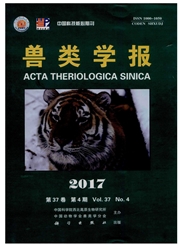

 中文摘要:
中文摘要:
本文主要研究了急性冷应激对牦牛乳腺上皮细胞热休克蛋白70(Heat stress protein,HSP70)表达量的影响。采用实时荧光定量PCR技术,以急性冷刺激10℃为典型研究环境,分析了HSP70 mRNA表达的变化规律。结果显示,乳腺上皮细胞在10℃分别冷处理2 h、4 h、6 h和8 h,其HSP70 mRNA的表达量变化均不显著(P〉0.05);分别在10℃冷处理2 h、4 h、6 h和8 h,再复温培养4 h,HSP70 mRNA的表达量均极显著增加(P〈0.01),于6 h达到峰值;在10℃先冷处理4 h,然后分别复温2 h、4 h、6 h和8 h,HSP70 mRNA的表达量亦均显著增加(P〈0.01),并于4 h达到峰值。结论:急性冷应激诱导牦牛乳腺上皮细胞HSP70表达量的增加不是发生在冷处理过程中,而是发生在复温过程中,并且在一定范围内随冷处理时间的增长表达量增高。
 英文摘要:
英文摘要:
The present study was carried out to investigate the effect of cold stress on the expression of Heat shock protein70( HSP70) in mammary epithelial cells of the yak. The changes of HSP70 mRNA expression in the condition of cold stimulation of 10℃ were determined by use of real-time fluorescent quantitative PCR technology. The results showed that no significant changes( P〉0. 05) of HSP70 mRNA expression would be found if the mammary epithelial cells were treated only in the condition of 10℃ for 2 h,4 h,6 h and 8 h,respectively. A significant increase of HSP70 mRNA expression would be found and reached a peak value( P〈0. 01) at the 6th hour of cold treatment if the mammary epithelial cells were first treated in the condition of 10℃ for 2 h,4 h,6 h and 8 h,respectively,and then reheated for 4h. A significant increase of HSP70 mRNA expression would also be found and reach a peak value( P〈0. 01) at the 4th hour of rewarming if the mammary epithelial cells were first treated for 4 h in the condition of 10℃,and then reheated for 2 h,4 h,6 h and8 h,respectively. It is concluded from this study that an increase of HSP70 mRNA expression does not occur in the process of cold treatment,but in the process of rewarming; meanwhile the increase of HSP70 mRNA expression is to some extent related with the time duration.
 同期刊论文项目
同期刊论文项目
 同项目期刊论文
同项目期刊论文
 期刊信息
期刊信息
